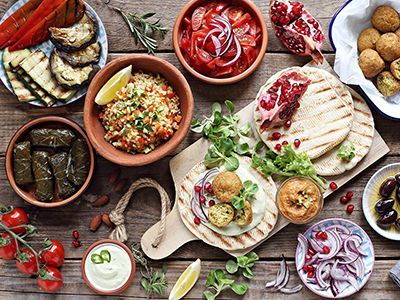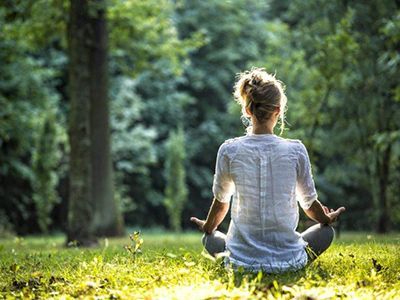3 Tips for Healthy New Year’s Resolutions
The start of a new year is the perfect time to reflect and think about the year that has gone by and what the new year will bring. Living in a saturated world, where we are all in a hurry, and do many and multiple tasks at the same time, we sometimes forget about our here and now and about ourselves. This way of life has its consequences. Improving our lifestyle depends largely on acquiring healthy habits. In other words, it isn’t a matter of being in constant movement but of being able to achieve a frequency and consistency carrying out certain activities that help us maintain our wellbeing. The World Health Organization (WHO) has put together 20 Tips to be Healthy (1) but we will only focus on a few.

1. Follow a Healthy Diet
The first tip they give us is to “Eat a Healthy Diet”. If you go down the list of tips, you can see that a few tips can be grouped into this first one: Consume less salt and sugar, reduce intake of harmful fats, avoid overuse of alcohol, don’t smoke, and be active. One of the basic pillars of a healthy lifestyle is our diet. This must be varied, balanced, healthy, and meet the needs of each person (age, sex, clinical situation, physical activeness, etc.). That’s why at Mederi Center we always recommend working with a healthcare practitioner who can tailor dietary recommendations to meet your specific health needs.

The WHO itself advises and highlights how important it is to consume proteins, fruits, vegetables, and healthy fats daily (2). In general terms, it is recommended to consume vegetables, fruits, and grains often. Other recommendations include cooking with olive oil, as well as alternating legumes, fish, poultry, and eggs during the week. Reduce the consumption of red meat and leave sweets and pastries for that special occasion. Our founder, Donnie Yance, and our Care Team practitioners generally offer similar recommendations, consistent with what the WHO advises, as well as the guidelines of a Mediterranean diet. For more information, see the post “The ETMS Diet: A Mediterranean-Inspired Diet Customizable for Optimum Health” and “Pesca-Flexa-Vegetarianism – The Ideal Mediterranean-Style Diet for Optimal Health”.
When looking at how to eat a healthy diet, we should also consider the origin of the word “Diet”. We can see that the word comes from the Greek word “diaita” (3), which means a way of life that embraces a whole healthy lifestyle to include both mental and physical health. Somewhere along the way it began to mean a food plan to lose weight. A healthy diet isn’t only about a balanced intake of food, but also everything else that surrounds the act of eating: how do we prepare this food? Where does it come from? How do we eat this food -- are we alone or enjoying it with others? We should try to dedicate time to what we are eating -- so sit down to enjoy your meal with the family, go grocery shopping with the kids (they learn many skills and good habits when they go grocery shopping, but that’s a whole other blog entry), and get in the kitchen to prepare meals together (4).

2. Be Active
Another tip from the WHO is to be active. Being regularly active is another one of the main pillars of healthy lifestyle habits. Physical activity allows us to improve and preserve our health. It must be activity adapted to different factors such as age and the situation of each person. In general, physical activity beneficial to health is that of moderate intensity carried out daily, or almost every day, lasting at least 30 minutes (5). It mainly has physiological benefits, since it helps control weight and body fat percentage, but it also strengthens our bones, muscles, and improves our general physical form. Regular physical activity also has a beneficial impact from a psychological point of view, since it improves our mood (helps prevents stress, anxiety and depression), our self-image, and our self-esteem.

3. Be Mindful
Our emotions and the way we manage them can have a direct impact on our health. When we feel good, we adopt habits that benefit our health. We take care of ourselves, exercise more, and rest better. All these healthy lifestyle habits in turn promote positive emotions, allowing us to further improve our personal wellbeing (6). A deep dive of the topic can be done with the previous post “Humility and Compassion for Robust Health and Happiness”. The WHO also advises us to talk to someone we trust if we’re feeling down. If you need support, don’t hesitate to reach out to a trusted friend, spiritual advisor, or professional counselor.
When choosing your resolutions for the coming year, focus on nurturing your body, your mind, and your soul. This way, you will be making your New Year’s resolutions healthy ones!
Join the Mederi Center community by signing up for our email list! We send several emails a month with product promotions for patients, practical tips for healthy living, blogs written by our practitioners, information about events, and other news. You can unsubscribe at any time.
Learn more about becoming a patient >>
References
1. World Health Organization. 20 Health tips for 2020. https://www.who.int/philippines/news/feature-stories/detail/20-health-tips-for-2020
2. World Health Organization. Healthy diet. https://www.who.int/news-room/fact-sheets/detail/healthy-diet
3. Dernini S. The erosion and the renaissance of the Mediterranean diet: A sustainable cultural resource. Quaderns de la Mediterrània. 2011;16:75–82.
https://www.academia.edu/12744267/The_Erosion_and_the_Renaissance_of_the_Mediterranean_Diet_A_Sustainable_Cultural_Resource
4. Reguant J. et al. Mediterranean Heritage: an intangible cultural heritage. Public Health Nutrition, Volume 12 , Special Issue 9A , September 2009 , pp. 1591 – 1594. DOI: https://doi.org/10.1017/S1368980009990413
5. World Health Organization. Guidelines on physical activity and sedentary behaviour. Geneva: World Health Organization; 2020. Licence: CC BY-NC-SA 3.0 IGO. https://apps.who.int/iris/bitstream/handle/10665/336656/9789240015128-eng.pdf?sequence=1&isAllowed=y
6. World Health Organization. Mental Health: strengthening our response. https://www.who.int/news-room/fact-sheets/detail/mental-health-strengthening-our-response


